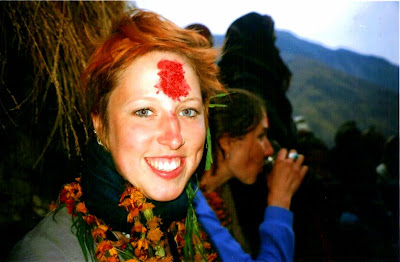It’s a long day’s walk that awaits us as we set off from Manma Hospital at 9am, only 1hr late on schedule. The house has been paid for, the wash buckets have been returned, the final exchanges about DFN's future cooperation with Manma’s DHO have been had, our neighbours the buffalos have been patted one last time , and we’re off heading into the hills again.
Today, we are heading for Lalit’s village, Mugraha, where he grew up and went to school. He hasn’t been home in 6 months and the light skip in his step betrays his growing sense of anticipation; eager that he is to see his family again and introduce us all to them; making the two ends of what is now his life meet for the first time; his Nepali family and his English family.
After the next hill, there is my village, he tells us. And sure enough, as the next bend unwinds, Mugraha appears in all its glory, its small houses disseminated across the hill's green, paddy covered flank. We have been walking for over 5h30 now and our legs are starting to tire, so spotting our final distatnaion feels tremedously uplifting. But suddenly, a new reality dawns upon us: we are one side of the valley and the village we are trying to get it is on the other; between us a 400 metre drop down to the river that we have to climb down before climbing back up again.
This constant rise and fall is typical of Western Nepali landscape and makes travelling in a straight line a frustratingly impossible endeavour, when “as the crow flies” generally means at least over two hours of walking.
As we’re standing there, dismally contemplating the last leg of our journey, we hear, coming from across the valley, a beat, the beat of a drum in the distance, booming out of a miniscule cluster of houses. They have spotted us, they have spotted Lalit and they are welcoming him home.
And so, after a quick interview of the local health post worker, we begin our descent, hurried by the beat, our dusty 5hrs weighing down on our knees, our heartbeat pounding to the sound of the echoing drums.
As we reach the crack in between the hills where the river flows, we are greeted by our first welcome committee, Lalit’s 12 year old sister and four of her friends. They look at us and giggle before bounding straight back up the sinuous path they have just run down, showing us the way. We begin our ascent slowly, pacing ourselves as we walk, trying to brush the scarlet red from our burning cheeks. As we climb, more and more heads pop out from behind rocks and trees, peering out at us from behind enormous dark brown eyes, scrambling over the rocks to get a better look at this strange procession of white people with red cheeks. Soon, our convoy is outnumbered by our followers as we, ourselves, turn into those following. We know that we are now approaching the village, escorted by this army of small children running around us, nearly tripping us up as we go.
Finally, we reach the paddy fields where we are greeted by the adults of the village, gathered around those whose music has been guiding us up across the valley. Swirling dancers, hypnotic drumming, wailing songs, gitfs and an appraisal of Lalit’s ancestors throw all our Western preconceptions and judgment aside, leaving us at the mercy of this spellbinding hospitality and generosity.
By that point, any pain or exhaustion has been completely forgotten, as we know that what we are receiving is a spectacular gift of friendship and respect. We drift up the hillside, as if carried by this myriad of smiling and inquisitive faces, each receiving a tikka, red rice placed onto your forehead by the elders of the village and dozens of mala, beautiful, hand-made flower necklaces to welcome us.
Tikka here, tikka there, tikka really everywhere, everyone wanting to welcome us to their village. None of us expected such a welcome, and we are all left speechless, smiling both bemusedly and excitedly at each other over the heads of our newly acquired friends.
When we reach the stone courtyard outside Lalit’s parents’ house, the drummers and the singer are already there waiting for us, specially commissioned by the family to play for us to celebrate our arrival. We are all sat down in plastic chairs, set out like thrones around the courtyard and given a very welcome cup of steaming massala tea under the gleaming eyes of well over 100 people dangerously amassed above our heads.
Over the course of our two day stay in Mugraha with Lalit’s family, we were treated with tremendous generosity. They housed, fed and even nursed us; Lalit’s mother sitting by Maia as she was bedridden for a day with a stomach bug. They also proved essential in helping us with our interviews, keeping the inquisitive crowds at bay and enabling us to carry out over 50 questionnaires in one day.
When we left, the family gave us another tikka ceremony and then accompanied us part of the way, Lalit’s youngest sister skipping over the muddy puddles in her plastic flip flops. We know that we now have friends in that valley, stuck in the middle of nowhere, a place where we will always be welcome.
Hospitality is a concept that they have mastered and preserved to perfection, one which puts our own to shame. And it was, with our hearts in our mouths, that we waved to them one last time from across the valley, hearing their chanting fading away into the distance, indelibly printed into our minds and hearts.
















No comments:
Post a Comment